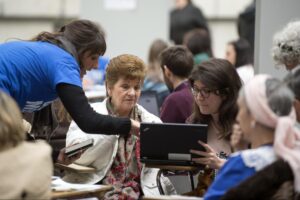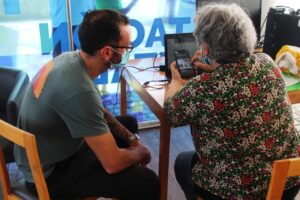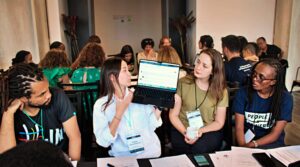Want to take public participation online? We’ve got you covered.
How can governments engage people in meaningful decision-making online? What are good practices for including all voices in digital participation, especially those most affected by policy decisions? How can we harness the benefits of rapid technological change while guarding against threats like disinformation? What are the best digital participation tools for governments with limited financial resources or technical expertise? These questions sit at the intersection of digital governance and public participation, two focus areas of the Open Gov Challenge.
People Powered serves as a global hub for participatory democracy — the direct participation of people in making the decisions that affect their lives. We aim to expand people’s power to make government decisions by addressing common challenges that are holding back open and participatory government around the world. Since 2021, People Powered has curated and created resources addressing challenges around digital participationMany governments are creating online mechanisms for citizens to petition, call for action, and participate in making decisions on issues they care about. Technical specifications: Refers to public p... More to help governments and organizations more effectively engage people online.

People Powered staff and members co-creating online resources to support public participationGiving citizens opportunities to provide input into government decision-making leads to more effective governance, improved public service delivery, and more equitable outcomes. Technical specificatio... in Mexico City, May 2023.
Members in the public participation and open government community identified this as the top priority in the first year of our annual participatory budgeting and planning process. They agreed that while the number of digital participation platforms kept increasing, it was difficult for reformers in government and civil society to choose the right tool for their context.

Community members deciding how to allocate funds in Madrid’s participatory budget during the G1000 Madrid Citizens’ Summit, 2018.
People Powered, with support from civic tech experts, developed an interactive guide to digital participation platforms, which explains the key features of these civic tech tools, shares lessons learned from users around the world, suggests best practices, and offers practical resources for selection and implementation. The guide offers answers to key challenges faced by governments exploring online participation: ensuring that participation is inclusive and accessible, thinking through the process of selecting a tool, getting help to set it up, guarding against cyberattacks, and more.
As with all of our resources, this digital participation guide was developed collaboratively and iteratively to ensure that contributors represent diverse genderOGP participating governments are bringing gender perspectives to popular policy areas, ensuring diversity in participatory processes, and specifically targeting gender gaps in policies to address gov... More and geographic backgrounds and account for different perspectives on what’s most helpful for people in various contexts.
We also collaborate with a tech review committee, composed of civic tech experts from five continents, to maintain ratings of digital participation tools. The committee evaluates more than 30 digital participation platforms across six criteria — cost, capacity requirements, features, accessibility, ethics and transparency, and track record and reliability — to help advocates and policymakers choose the digital participation platform that best suits their needs. Along with the committee’s careful review of each platform, the ratings are based on feedback from hundreds of users and the platform developers themselves. We’ll launch the third edition of the ratings on March 14 — join us to hear from committee members about the evaluation process and key insights on the current state of digital participation!

Teaching in action at a “digital station” in Rosario, Argentina, which aim to boost digital literacy of seniors and young people.
For government reformers who want additional support to choose and implement online participation tools, we offer a digital participation online training. The free, self-paced course, which brings together content from the guide, ratings, and case studies of digital participation at work, is available in five languages.
Our aim in developing these resources is to empower governments to engage people online, by synthesizing global knowledge and presenting it in accessible formats. We also hope to nudge the institutions that use digital tools and the developers that create them to adopt good practices on issues like inclusionOGP participating governments are working to create governments that truly serve all people. Commitments in this area may address persons with disabilities, women and girls, lesbian, gay, bisexual, tr... More, transparencyAccording to OGP’s Articles of Governance, transparency occurs when “government-held information (including on activities and decisions) is open, comprehensive, timely, freely available to the pub... More, accessibility, and privacy, which can in turn foster more positive participation experiences with a meaningful impact on decision-making.
We invite the OGP community to use these resources in working to support robust digital governanceAs evolving technologies present new opportunities for governments and citizens to advance openness and accountability, OGP participating governments are working to create policies that deal with the ... More that centers public participation. They’re a great place to start when designing digital engagement for the co-creation of OGP action plans, or as a source of inspiration for reforms on digital participation.
Comments (2)
Githinji Kamotho Reply
Thanks for this very important discussion,Intrestingly enough in Africa almost the entire continent has no one country with a Public Participation Act,this makes us wonders who benneffits when a bigger chunk of societies dont engage.
Leave a Reply
Related Content
 Uncategorized
Uncategorized Six Ways to Protect Democracy against Digital Threats in a Year of Elections
2024 has been dubbed the “year of elections”, with over four billion people expected to vote across more than 60 elections. This should be a cause for democratic celebration, but…

The Open Gov Challenge
Join hundreds of reformers around the world - in government and civil society - who are working to make their communities stronger, more open, participatory, inclusive, and accountable.

Digital Governance in OGP
OGP countries are leveraging the opportunities of evolving technology, such as artificial intelligence, data-driven algorithms, and mass social networks, while also developing policies to deal with the threats, including disinformation,…


Patricio Peñafiel Reply
Estamos iniciando un proceso de “formalización” del gobierno abierto en nuestra institución (Gobierno Provincial), queremos aprovechar las tecnologías para facilitar la participación, para ampliar la participación hacia sectores poblacionales -niños, adolescentes, jóvenes- que son los que menos participan pero que mejor manejan las tecnologías; queremos desarrollar una plataforma para la participación ciudadana.